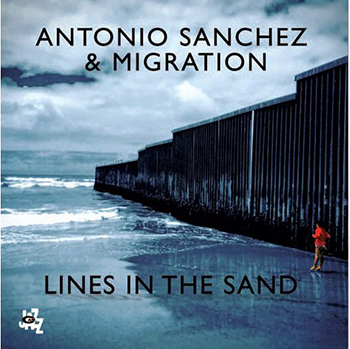
Antonio Sanchez broke new ground for musical storytelling with his award-winning soundtrack for “Birdman.” He’s earned multiple Grammys for his work with guitar master Pat Metheny. Now, Sanchez, one of the most acclaimed drummers and composers in jazz today, is heading to Merced for a one-night performance.
The Mexico-born Sanchez will perform with his band, Migration, at the Merced College Theater on Feb. 15 at 7 p.m. Free tickets for the concert are available at the Merced Multicultural Arts Center, UC Merced Center for the Humanities, and the Merced College Bookstore.
“Antonio Sanchez performs in the best-known music venues in the U.S. and all over the world. It is such a treat to have him and his group in Merced,” said music Professor Patricia Vergara, director of Arts UC Merced Presents.
“Merced and the Central Valley, generally, are under-served when it comes to live music of this calibre. One of the missions of Arts UC Merced Presents is to not only contribute to mitigate this need but also to amplify diverse and underrepresented voices in the arts. Antonio Sanchez's music and career trajectory are a great statement of how jazz has always been shaped by the contributions of diverse groups and communities.”

Sanchez began drumming at age 5 and studied classical piano at Mexico’s National Conservatory. In 1993, he moved to Boston and studied at the Berklee College of Music and the New England Conservatory, graduating Magna Cum Laude in jazz studies.
Growing up in Mexico City, Sanchez absorbed the bounty of Latin music styles available there in addition to the rock music he loved. While studying at Berklee, Sanchez recalled that he learned even more styles out of necessity.
“I had to work as much as I could,” he told Berklee Today. “The peso had fallen to half its value against the dollar, so it was very expensive for me to attend Berklee. I was playing anything in those years: reggae, soca, salsa, and with wedding bands.”
For more than 20 years, Sanchez has been one of the world’s most sought-after jazz drummers. In addition to his collaboration with Metheny, he also has recorded and performed with Chick Corea and other prominent artists.
His popularity soared in 2014 when he scored the percussion-driven soundtrack for filmmaker Alejandro González Iñárritu’s “Birdman,” which won four Oscars and earned Sanchez a Grammy.

Sanchez has close to a dozen recordings as a leader and solo artist. On his 2019 release, “Lines in the Sand” with Migration, Sanchez pays tribute to the journey of immigrants and calls out the injustices they face.
According to an NPR review of the album, Sanchez “was incensed by the scenes of family separation at the border, yet he avoids expressions of anger or outrage. Instead, these fluid, fast-changing pieces focus on the life-altering journeys themselves, evoking the spirit and determination necessary to make them.”
Sanchez’s personal story was shaped by immigration. His grandfather, as a young man, migrated to California to pick oranges, Sanchez said in an interview with WBGO’s The Checkout.
One day, the grandfather fell from a tree and broke his back. He was sent back to Mexico, where a doctor tried an experimental procedure to fuse his spine. During months of recovery, he read poetry, literature and plays and he was inspired to pursue the arts. Sanchez’s grandfather, Ignacio Lopez Tarso, became one of the most famous actors of Mexico’s Golden Age of cinema.
If not for his grandfather’s fall from the orange tree, Sanchez said he would not have become the artist he is. “I would’ve been a completely different person.”
Vergara said the inspiration behind Sanchez’s music is certain to appeal to a wide audience.
“Given the critical moment we live in now and our local demographic, the themes explored by Antonio Sanchez and Migration couldn't be more fitting,” said Vergara, who studied with Sanchez at Berklee.
The appearance by Antonio Sanchez and Migration is part of the Arts UC Merced Presents performance series and is supported by the UC Merced Chancellor’s Office and the Center for the Humanities.






